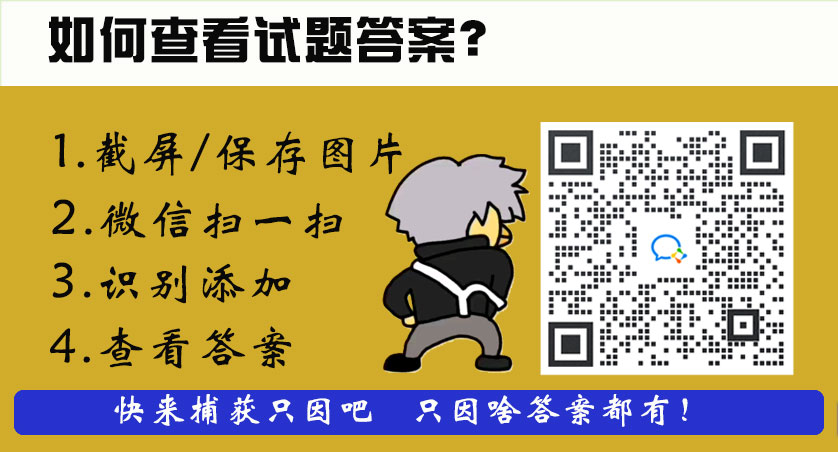学英语八年级第17期答案上册,我们目前整理分享关于学英语八年级第17期答案上册及其参考答案,2如需答案 请关注微信公众号:考不凡/直接访问www.kaobufan.com(考不凡)

1、学英语八年级第17期答案上册
2、学英语九年级安徽综合能力提升
3、求知报八年级 英语 JX春季报纸试卷闯
18.Lao She wrote Teahouse in 1957.The play shows the audience life in China between 1898and 1945.It takes place in a teahouse in old Beijing and it tells us the story of Wang Lifa and his customers.It asks us to see the teahouse as the centre of the neighborhood.Finally,it says goodbye to old Beijing and its people.The story starts in 1898during the Qing Dynasty.It continues in 1916,and finally,it brings the audience to the end of the Anti-Japanese War in 1945.After the war,Wang loses the teahouse and he dies.Lao She was born in Beijing in 1899.His parents sent him to the Teahouse's School in Beijing and he learned to teach.Form 1924to 1929he taught Chinese to the English in London.He wrote many plays,novels and short stories.He was named a"People's Artist"and a"Great Master of Language".He was one of the greatest Chinese writers of the 20th century.In Lao She's Teahouse today,waiters bring tea to the customers and sell them delicious Chinese food.If you like Beijing Opera,folk music,acrobatics or magic shows,you can enjoy them in the teahouse.Lao She's Teahouse gives a wonderful welcome to everyone from China and from all over the world.
66.How many years of life in China is shown in the play Teahouse?A
A.47years. B.45years. C.98years. D.57years.
67.When does Wang Lifa lose the Teahouse?D
A.Before 1945. B.In 1916. C.In 1898. D.After 1945.
68.Lao She was all of the following exceptC.
A.a Great Master of Language
B.a people's Artist
C.a boss of Teahouse
D.one of the greatest Chinese writers of the 20th century
69.Who were welcome to Lao She's Teahouse today?C
A.Only Beijing opera audience
B.Only foreign customers.
C.Every customer from home and abroad.
D.Only Chinese customers.
70.What's the main idea of Paragraph 4?B
A.Lao She.
B.Lao She's Teahouse.
C.The story of Teahouse.
D.The play Teahouse. 试题答案
分析 在1957年老舍写的《茶馆》.这戏剧表现的是生活在1898年和1945年之间中国观众的生活.它发生在老北京的一家茶馆,它告诉我们王利发和他的客人的故事.它让我们能够看到以茶馆中心的邻里关系.最后,它说再见老北京和它的人民.这个故事在清朝的1898年间开始了.它继续在1916年,最后,它把观众带到抗日战争的1945.战争结束后,王失去了茶馆,他死了.老舍1899年出生于北京.他的父母把他送到了北京的茶馆学校,他学会了教书.在1924年到1929年他在伦敦教中文.他写了许多剧本,小说和短篇小说.他被命名为"人民的艺术家"和"伟大的语言大师".他是二十世纪最伟大的中国作家之一.在老舍的《茶馆》里,服务员把茶带给顾客,并把美味的中国菜卖给他们.如果你喜欢京剧,民间音乐,杂技或魔术表演,你可以在茶馆里欣赏他们.老舍的《茶馆》对每一个来自中国和世界各地的人都给予了一种极好的欢迎.
解答 ADCCB
66.A.细节理解题.根据语境The play shows the audience life in China between 1898and 1945.可知在戏剧《茶馆》里讲述了47年的中国的生活.故选:A
67.D.细节理解题.根据语境It continues in 1916,and finally,it brings the audience to the end of the Anti-Japanese War in 1945.After the war,Wang loses the teahouse and he dies.可知王利发在1945年之后失去了茶馆和生命.故选:D
68.C.细节理解题.根据语境He was named a"People's Artist"and a"Great Master of Language".He was one of the greatest Chinese writers of the 20th century.可知老舍不是茶馆的老板.故选:C
69.C.细节理解题.根据语境Lao She's Teahouse gives a wonderful welcome to everyone from China and from all over the world.可知来自国内外的每一位顾客都被欢迎到老舍茶馆来.故选:C
70.B.主旨大意题.根据语境 Lao She wrote Teahouse in 1957.可知文章主要讲述茶馆的故事.故选:B
点评 本文是人物故事类阅读理解.这类题材是高考常考的内容,它注重考查考生对整体内容的理解和把握,要求考生做题时要结合语境及题目要求做出正确的选择.
根据短文内容,从短文后的选项中选出能填入空白处的最佳选项,选项中有两项为多余选项。
Taking good notes is a time-saving skill that will help you to become a better student in several ways. 1.
Second, your notes are excellent materials to refer to (参考,查阅) when you are studying for a test. Third, note-taking offers variety to your study time and helps you to hold your interest.
You will want to take notes during classroom discussions and while reading a textbook or doing research for a report. 2. Whenever or however you take notes, keep in mind that note-taking is a selective(精挑细选的) process. 3.
The following methods may work best for you.
● Read the text quickly to find the main facts and ideas in it.
● Carefully read the text and watch for words that can show main points and supporting facts.
● Write your notes in your own words.
●4.
● Note any questions or ideas you may have about what was said or written.
As you take notes, you may want to use your own shorthand(速记). When you do, be sure that you understand your symbols and that you use them all the time. 5.
A. Use words , not complete sentences.
B. There are three practical note-taking methods.
C. You must write your notes on separate paper.
D. Otherwise(否则), you may not be able to read your notes later.
E. You will also want to develop your own method for taking notes.
F. That means you must first decide what is important enough to include in your notes.
G. First, the simple act of writing something down makes it easier for you to understand and remember it.